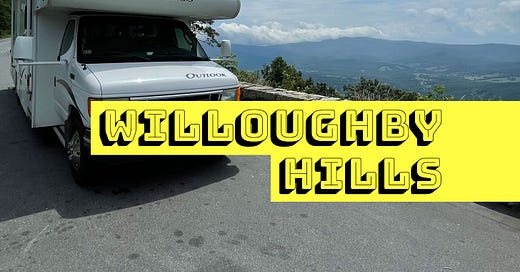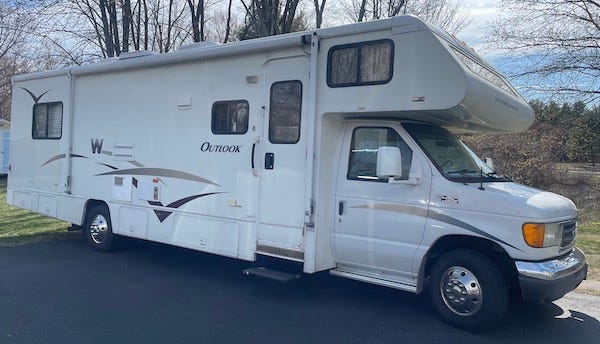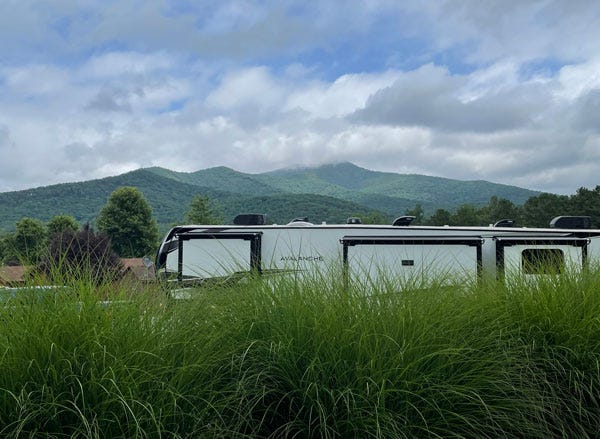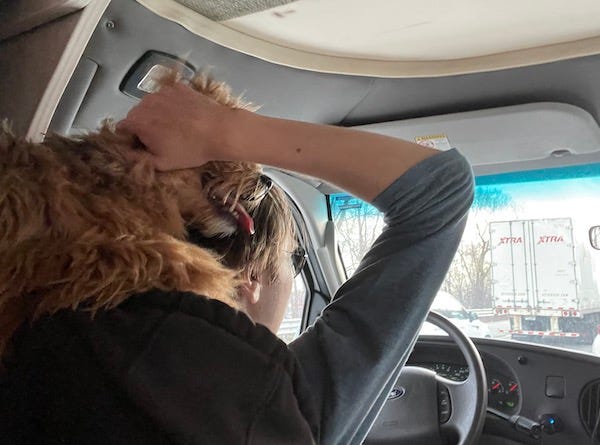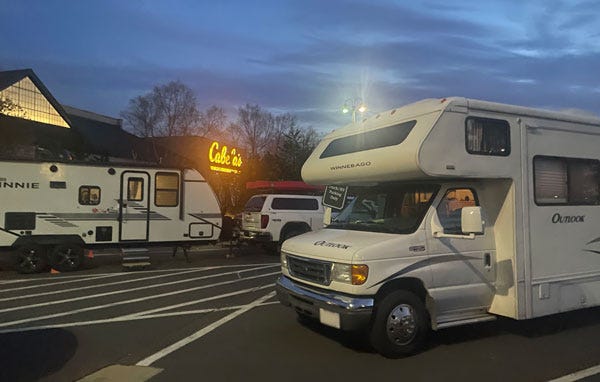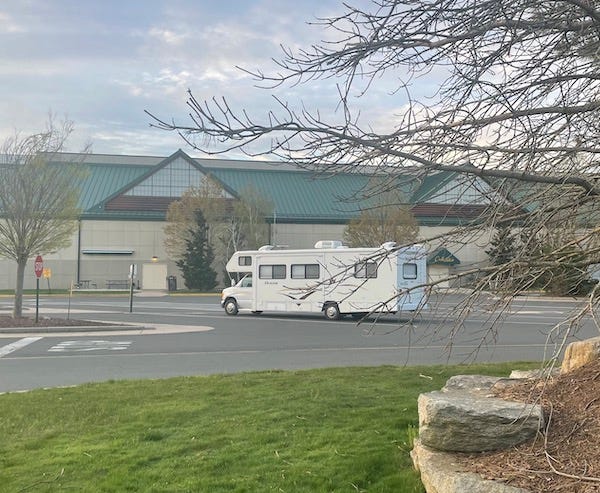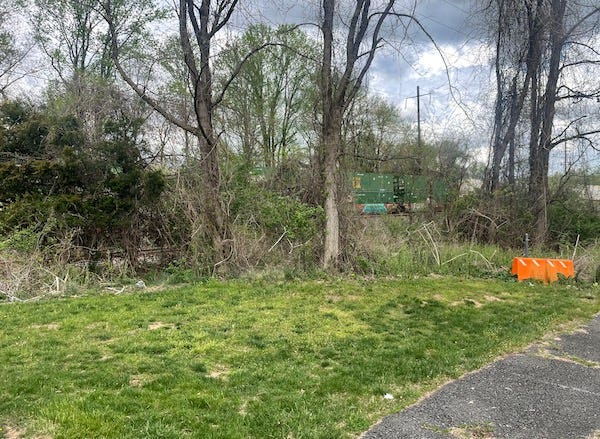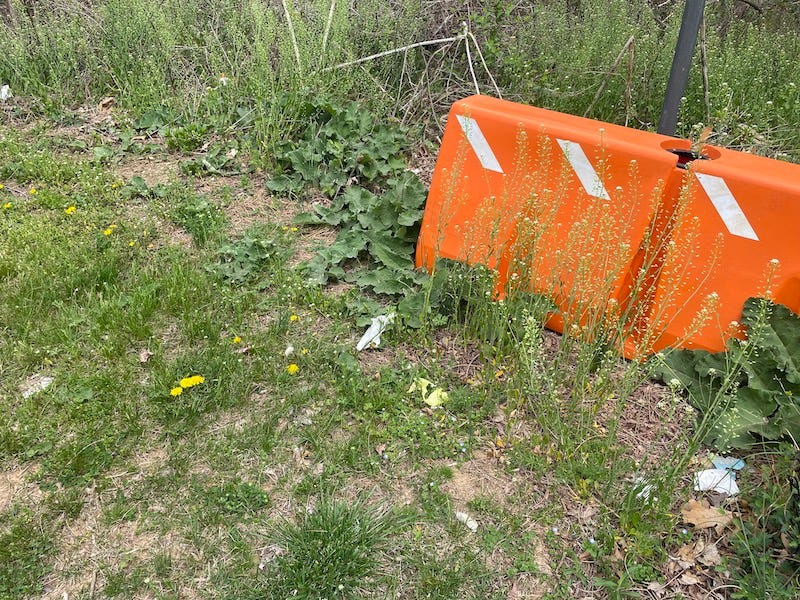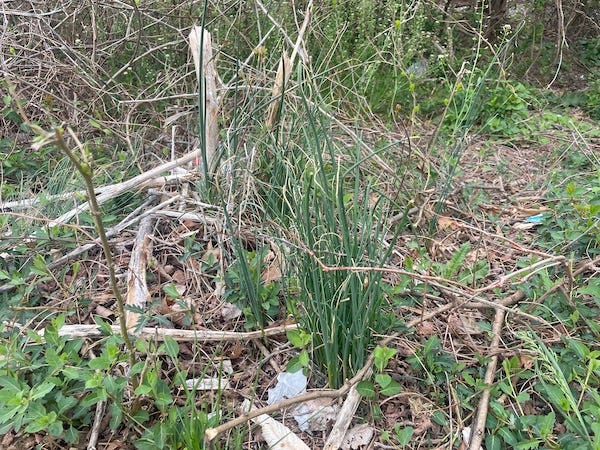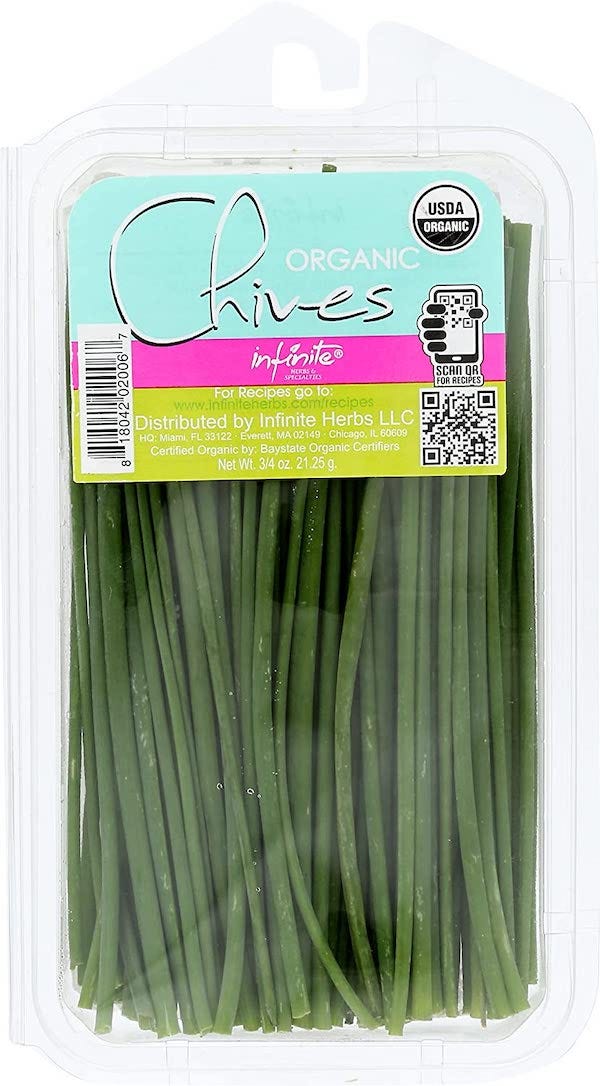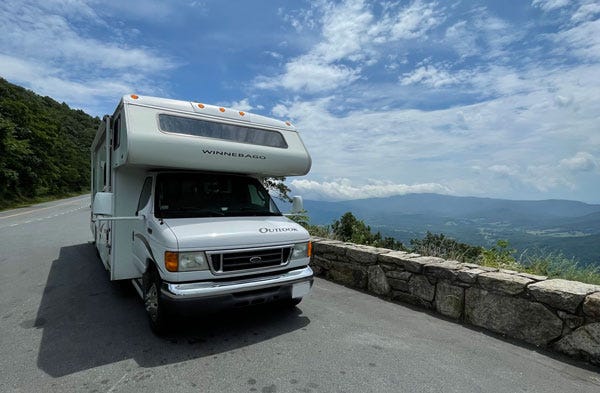Opening My Eyes to "nature"
Whether you're looking for Nature with a capital N or nature with a lower case n, you'll find it
Welcome to another edition of Willoughby Hills!
This newsletter explores topics like history, culture, work, urbanism, transportation, travel, agriculture, self-sufficiency, and more.
If you like what you’re reading, you can sign up for a free subscription to have this newsletter delivered to your inbox every Wednesday and Sunday and get my latest podcast episodes:
This weekend marks the start of spring break here in Massachusetts. For us, it also means the beginning of RV season. We are on the road as I publish this, waking up to a misty morning at our favorite alpaca farm.
I have mixed feelings about being an RV owner. I have immense guilt about barreling down the highway clocking only 9 miles per gallon and often feel like more of the problem than the solution. My house has solar panels, my wife drives a hybrid car, and we recycle, but I’m not sure that those good deeds outweigh the sheer quantity of fossil fuels that this beast chugs on a single trip.
However, the paradox in all of this is that being an RV owner has completely changed my relationship to nature. Yes, there are a number of campgrounds in and around National Parks, scenic mountains, or pristine beaches where we can park and enjoy nature. We’ve stayed at many of them.
Although in this case, I’m not talking about Nature with a capital N. You know, the kind of places curated and maintained by rangers and set aside for the enjoyment of all people. The places in Ken Burns films. I’m really talking about lower case nature, the beautiful natural world that is around us everyday and of which we are a part.
A few weeks ago in this newsletter, as I often do, I quoted Wendell Berry. If you’ll indulge me, I’d like to share the same quote again, because I think it applies to the point I’m trying to make today:
“The concept of country, homeland, dwelling place becomes simplified as ‘the environment’- that is, what surrounds us, we have already made a profound division between it and ourselves. We have given up the understanding- dropped it out of our language and so out of our thought- that we and our country create one another, depend on one another, are literally part of one another; that our land passes in and out of our bodies just as our bodies pass in and out of our land; that as we and our land are part of one another, so all who are living as neighbors here, human and plant and animal, are part of one another, and so cannot possibly flourish alone; that, therefore, our culture must be our response to our place, our culture and our place are images of each other and inseparable from each other, and so neither can be better than they other.”
I want to more deeply explore our inseparability from nature today. The notion that nature is not a place we go or something we gaze at, but is instead a fundamental part of who we are and what our planet is. The irony that this relationship to nature is deepened as a result of spending time in an RV is not lost on me, but there is something about living in a motorhome that presents differently than driving a car, sleeping in a tent, or staying in a hotel.
This trip is our first time traveling with our six month old puppy. We had hoped to spend some time acclimating him to the RV before our travels. But our motorhome was in the shop for most of the winter having some repairs and maintenance performed and was only ready a day before our trip. It was a foreign space for our dog, but we had no choice but to jump in head first and hope for the best.
We started out later than we’d hoped on Friday afternoon, both my wife and I having work to complete before we could hit the road. We ended up getting stuck in traffic with all the other parents leaving for spring break after work and were behind schedule. It was evening, our kids were getting hungry, and we decided to pull over at a rest area to make dinner (after all, we were traveling with a fridge full of food, a stove, and a microwave!).
While my wife creatively whipped up a dish in our RV kitchen, I leashed up our lhasapoo puppy and took him for a walk. We were walking in a little grassy ravine that separated the rest area from the interstate. It was an unremarkable patch of dirt, grass, and weeds with scattered litter. But I noticed my dog aggressively sniffing the ground, his hunter instinct kicking in.
As I looked at the grass, I noticed the distinctive channels and holes of voles, little rodents that plague our own lawn every year. He was keen on their scent and was hoping to catch one.
I was a bit befuddled. This was a wasteland. On one side of me, cars and trucks were speeding by at 70 miles per hour. On the other was a parking lot for a McDonald’s and a gas station. Yet somehow, a family of voles decided this was the place where they wanted to settle?!
As our pup sniffed, I continued to imagine life for these voles. I suppose to them, grass is grass. They have no idea how the other voles around them live. They don’t know the quiet of a suburban backyard or the solace of a forest. They want to dig holes and eat grass, which they can do just as happily in this mediocre median, thank you very much.
Because of the traffic, our kids were tired and we called it a night much earlier than we’d hoped. We decided to try sleeping in the Cabela’s parking lot in East Hartford, Connecticut, usually about 90 minutes from our house, but with traffic it was closer to two hours.
In the RV community, there are certain places where folks can reliably spend the night for free: Cracker Barrel, Wal-Mart, and Cabela’s being among these. We’d never slept in a Cabela’s parking lot before, but decided to give it a go.
We arrived at dusk and parked in the RV lot. An older couple with a travel trailer were our neighbors for the night. The noise of their generator drowned out any other sounds when we went to bed, but when we awoke the next morning, the couple had left and we were alone in the parking lot.
We heard a symphony of birds chirping. We heard owls hooting. This particular Cabela’s is a bit off the freeway and is in a quiet neighborhood near the U Conn stadium. On days when there’s no event at the stadium, it can be very quiet traffic-wise. But we didn’t expect to hear so many birds.
It was as peaceful as staying in a campground in the woods, which can sometimes charge $100 per night or more. This experience was completely free. With our shades drawn and no visual clues as to the sea of asphalt around us, the sounds of birds felt like we were in Nature. But I was reminded again that we were in, and were always inseparable from, nature. Lower case n.
Our first destination on this trip was Sesame Place, the Sesame Street themed amusement park outside of Philadelphia. We bought season passes last year and it became a favorite destination for our kids, so we opted to renew the passes for this current season.
Of course, having a dog means we have to vacation a little differently. We opted to share kid and dog duties, with one parent taking the kids into the park, while the other stayed in the RV with our pup, switching off throughout the day. This way, we could ensure he always had water and didn’t get overheated.
I was on dog duty first and took him for a walk along a grassy strip at the back of the Sesame Place parking lot. Beyond the grass is a shrubby natural hedge of taller plants that seem to have grown up over time and help screen the view of freight railroad tracks.
As I walked in that area with my dog, I was struck by the number of flowers. Granted, these weren’t beautiful flowers to cut and put in a vase, but they were flowers none the less. It reminded me of a story I produced for Ask This Old House many years ago about home beekeeping. The intro to that story has been truncated on YouTube, but the gist was that our landscape contractor met beekeeper Noah Wilson-Rich of Best Bees on the roof of a hotel in the middle of Boston that houses beehives.
I was a bit surprised that a beekeeper could sustain hives in an area which looked to me like just tall buildings, concrete sidewalks, and asphalt streets. But Noah helped me see the neighborhood through the eyes of a bee that’s only seeking out flowers. Sure there may not be daffodils and tulips growing everywhere, but there was nectar and pollen to be had for a bee. He pointed out the weeds that grow in sidewalk cracks as an example, and that has stuck with me for more than a decade.
I noticed the same dynamic at work on this scrubby stretch of unplanted borderland in the Sesame Place parking lot. A bee, a butterfly, or any other nectar loving insect could have a feast in an area that seemed completely useless.
As I looked closer, I noticed that humans could even eat off of this land! Between the parking lot and the railroad tracks were several chive plants, a weed to those who could not identify it, but gold to me! I didn’t harvest any, but I was struck by our differing perceptions of chives.
Here they were, growing in the wild, planted perhaps by bird droppings, seeds being carried by the wind, or who knows what other method. To me, a chive plant is something bought from a garden center and planted in a garden or a window box and carefully harvested. For others, it might be something that comes in a plastic clamshell case at the grocery store, grown in another hemisphere and shipped here (I’ve written about basil in this context before).
These are some reflections after only three days on the road. As I look at the world with this new framing, I wonder how many other ways I will find nature over the next week.
Nature (capital N) is amazing and worth seeking out, but nature is also around us all the time, if we keep our senses open to it. We too are nature.
With that, I think it’s only appropriate to close with another Wendell Berry quote, this one from 2003’s The Art of the Commonplace: The Agrarian Essays of Wendell Berry:
“Outdoors we are confronted everywhere with wonders; we see that the miraculous is not extraordinary, but the common mode of existence. It is our daily bread.”
Thanks for reading Willoughby Hills! Subscribe for free to receive new posts and support my work.
Related Reading
Getting Acquainted with Wendell Berry
If you’ve missed past issues of this newsletter, they are available to read here.


